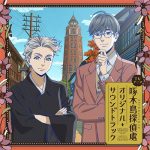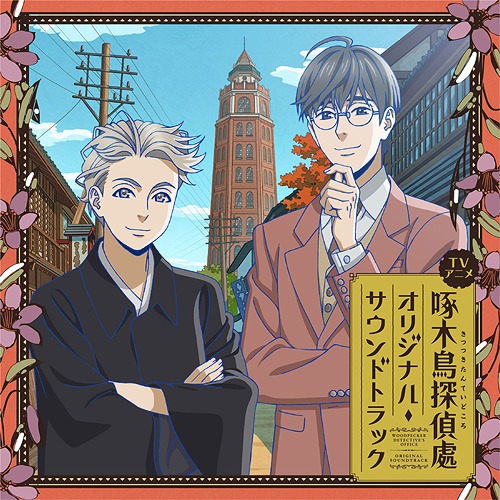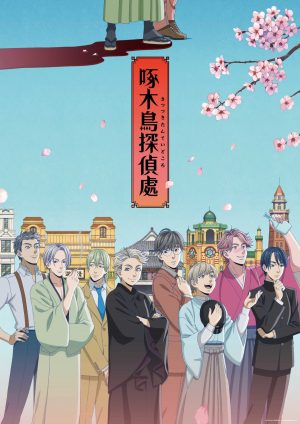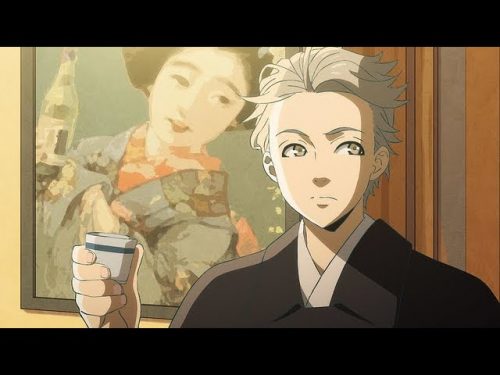

[sourceLink asin="" asin_jp="" cdj_product_id="LACA-9754" text="" url="" ]
This largely overlooked Spring 2020 anime follows fictionalized versions of Meiji-era poet Takuboku Ishikawa and his long-suffering linguist friend Kyousuke Kindaichi as they solve mysteries together and get along like two toxic boyfriends who have nobody else to bother but each other. The jazzy OP is a certified slapper and the pastel animation is consistently charming, but what about the story itself? Let’s see if this literature-infused mystery show deserves more attention than it got.
-- Spoilers Ahead! --
Real-Life Origins

[sourceLink asin="" asin_jp="" cdj_product_id="BIXA-1293" text="" url="" ]
Ishikawa, Kindaichi, and their menagerie of writer friends are all based on real people who lived in early 1900s Japan, but their Holmes and Watson style detective adventures are purely fictional. That said, Woodpecker Detective’s Office frequently uses Ishikawa’s poems to emphasize important character moments, Kindaichi’s future work with the Ainu people is hinted at in a few episodes, and the looming dread of Ishikawa’s inevitable death from tuberculosis is taken straight from the pages of history. Most of these references will go over an English-speaking viewer’s head, but it’s fun to do a little research to see where this anime takes its inspiration from.
Is It a Good Mystery Anime?
Um... not really. Unfortunately, this show has some big flaws, and they mostly have to do with the cases that the Detective’s Office solves week to week. They all follow a predictable formula – an accusatory letter appears that exposes some societal injustice, someone connected to that injustice dies under mysterious circumstances, and Ishikawa uses his wits to determine that the most innocent-looking person is actually behind it all. Usually, the real culprit ends up dying, as well. Expect Ishikawa to bum money off of Kindaichi for some “noble cause” related to the case, only to turn around and spend it on food and women in the pleasure district, and for Kindaichi to make excuses for him because he’s too in love with Ishikawa to realize that he’s being used.
This anime is based on a much shorter novel, so perhaps the story structure worked better in that context, but the adaptation doesn’t switch up the formula enough to keep our interest from one episode to the next.
Is It a Good Character Study?
It takes entirely too long to get to that point, but yes. Up until episode 8, Ishikawa has been nothing but a toxic nuisance to Kindaichi – he borrows money that he never pays back, pawns off Kindaichi’s books without asking, and sometimes even puts him in danger for the sake of a hunch on whatever case they’re trying to solve. The other members of the writer squad know that he’s a piece of shit, but Kindaichi is convinced that he’s meant to protect Ishikawa no matter what. Why on earth does he let this guy walk all over him?
The very first scene of the anime is set 10 years in the future, where an older Kindaichi visits the now-empty boarding house where he and Ishikawa used to live, and even the OP clearly shows that Ishikawa is fated to die at a young age. It wouldn’t really be a spoiler anyway, since the story is based on real events that are only a Google search away, but Ishikawa’s impending death actually explains a lot of his and Kindaichi’s behavior throughout the story.
Ishikawa has known for a long time that he’s dying and has presumably led such a careless and selfish life because of it, but finally finds his purpose in episode 8 when he falls in love with a woman named Tamaki who tells him that he should live to serve society. When she unexpectedly dies, his health takes a sharp turn for the worse and he tries to honor her wishes with the short time he has left. Unfortunately, being a model citizen doesn’t suit him, so he quickly reverts back to his old ways and spirals into depression. He’s only saved from suicide by Kindaichi, who has probably been so loyal all this time because he knew that Ishikawa was deathly ill and didn’t want him to suffer.
Does this excuse Ishikawa’s horrible behavior or Kindaichi’s enabling? No, but it is an intriguing character study of a self-destructive genius artist and his friend who was willing to sacrifice his own wellbeing to serve as inspiration for that genius’ poetry. If you’re interested in this aspect of the anime, you could watch the first couple of episodes and then skip to episodes 8 – 12 without missing much.
Final Thoughts

[sourceLink asin="" asin_jp="" cdj_product_id="" text="amazon.co.jp" url="https://www.amazon.co.jp/dp/B08726WZ44/" ]
Woodpecker Detective’s Office is a frustrating show because it has this fascinating character study buried within it, but you have to dig through so much filler just to get there. And even then, episode 12 focuses more on the mystery aspect than Ishikawa and Kindaichi’s relationship, so nothing gets resolved properly. You’d probably be better off just listening to the OP on loop and watching Death Note or Berserk instead.
What did you think of our review? Did you watch this show? Do you think Ishikawa and Kindaichi’s relationship is obnoxiously toxic? Let us know in the comments, and thanks so much for reading!
[author author_id="103" author="" translator_id=""]
[ad_bottom class="mt40"]
[recommendedPost post_id='257933' url="" title="" img='' class="" widget_title=""]
[ad_2]
